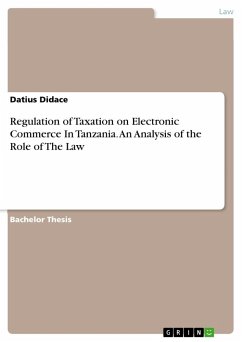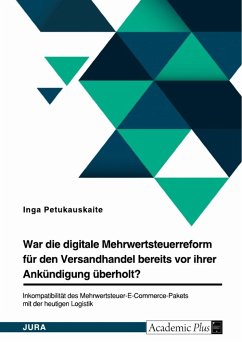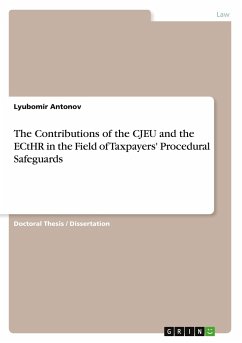Bachelor Thesis from the year 2022 in the subject Law - Tax / Fiscal Law, grade: 23.3.2, Mzumbe University, language: English, abstract: This study explores three specific research questions: Is the absence of clear law governing taxation of e-commerce the main challenge facing taxation of e-commerce in Tanzania? Does the tax legislation in Tanzania effectively help toward achieving tax compliance on electronic commerce in Tanzania? How effective is the Tanzanian legal framework and the regulatory pieces of machinery on the taxation of e-commerce in Tanzania? The research assumes that, the challenges in respect of taxation of e-Commerce are centered on determination of value of supply of goods and services, permanent establishment and place of supply of goods and services and also payment services in Electronic Business Transaction. All these challenges which have not well been articulated by the tax laws in Tanzania makes the Government to lose revenue from taxation of E-commerce. Based on taxation of electronic commerce including all people involved in selling and buying of products online like taxation of income to the people who sell products like shoe clothes, domestic equipment, transport facilities, Cars, Laptops, and other products by using websites, Instagram, WhatsApp status as well as by attaching their products on YouTube consumer based retail sites and get customers finally to sell their products and trading in product services using computer networks such as the internet. This revenue loss is particularly worrying to governments that rely heavily on tax revenue as a source of funding their fiscal programs. To provide a better understanding of this critical but complex subject, this study explores the issues related to e-commerce taxation through a review of relevant extant literature. It analyzes the challenges posed by the growth of e-commerce and makes proposals on how e-commerce can be developed with proper tax regulations by articulating key policy recommendations that will aid/inform the establishment of a sound regulatory framework for e-commerce taxation. The study has important legal and policy recommendations which, if implemented, would provide tax administrations with an appropriate and effective response to some of the challenges of Electronic Commerce.








